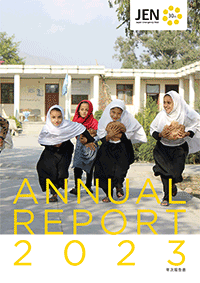Improvement of life through “Cash For Work”~Interview of Ms. Rasya, a Syrian refugee~
Now that we are in September in Zaatari Refugee Camp, sometimes we have cloudy days under 35 degrees Celsius, but most days are extremely hot, reaching nearly 40 degrees Celsius.
In this blog, I would like to introduce the following two topics:
1.Paid Volunteer program called “Cash For Work”
2.An interview of a community center guardwoman, as part of this program
=====
1.What is Cash For Work?
Cash for Work (hereunder, “CFW”) is a program in which refugees work as paid volunteers to improve environment and services of the camp, and in return, receive remuneration.
In Japan, this program was run for the rehabilitation and reconstruction support of Great East Japan Earthquake. Victims of the Earthquake who participated in this program supported local communities through restoration work. The program gathered attention as it enabled affected people’s self-reliance.
JEN’s CFW program in Zaatari camp is a variety of public services such as cleaning, guardman/womanship of JEN’s facilities, and reparation work. JEN welcomes participation of women and disabled people who generally have hard time finding jobs.
Now we will introduce interview of Ms. Rasya, a Syrian refugee who works as a guardwoman of community center.
She spoke about her life in Syria – how she sought refuge in Zaatari Camp in Jordan, the difficult early days in Camp, and some changes in her everyday life after she started working as CFW.
2.“This work gave me confidence” ~Interview of Ms. Rasya~
“My name is Rasya, I am 28 years old and I am from a village of Daraa District in Syria.
【Ms. Rasya responding to questions of JEN staff (front of photo)】

“I was married before in Syria, had one daughter. After I got divorced with my husband, I returned to live with my family. As my daughter was little, I spent most of my time at home. I rarely left the house, just to go to the hospital and to do shopping when necessary.”
“After the civil war started, I sought refuge here, Zaatari Camp in Jordan on 26 November 2011. At that time life was very difficult, so I remember the date very well.”
“In the beginning I shared one tent with my family and daughter, a total of 10 people. We shared the bathroom and shower with other families. Clean water tank was also shared with other families, so I always had to go to the shared tank to collect water for myself, and sometimes we could not receive the amount of water we were supposed to.”
“I started working as a guard of JEN’s community center from 2nd of July this year. My shift is every morning from 8:00 to 12:00. My job includes opening and closing the gate, monitoring goods in the community center, and informing JEN staff when we keep things for other organizations. Also I clean and water plants here.”
“Before I started working, I spent my day without doing much. When I went out, it was to go to the hospital, or to receive food distribution. But through this job I gained self-confidence.”
“I can support my family financially, and I became mentally stronger as I began to think that I am supporting somebody. Before there were not many CFW program for women, but the situation is improving, for instance I was able to get this job as a guardwoman.”
“Participation to CFW has become a necessary income source for single mother family like mine.”
【Community center of JEN in District 4 where Ms. Rasya works as a guardwoman】

Through this CFW program, JEN will continue to support families having economic difficulties including households with women like Ms. Rasya and/or persons with disability.
△▼△▼△▼△▼△▼△▼△▼△▼△▼△▼△▼△▼△
JEN will be there for the most vulnerable households to keep providing the support they need.
【JEN is now accepting donations. Your help would be very much appreciated. DONATE here】
△▼△▼△▼△▼△▼△▼△▼△▼△▼△▼△▼△▼△

![Jordan[Syrian refugees] Blog](/en/project/images/mainimg_project_jordan.jpg)




